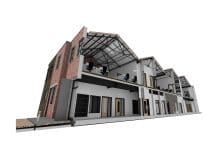Interstate Electrical has gone on a lean journey with Revu
Founded in 1966, Interstate Electrical is a regional, family-owned, commercial electrical contractor tackling everything from Fortune 500-level projects to fit-ups for start-ups. It aspires to be a customer-centric company but also one where employee talent and determination are rewarded.
“Around 2014, we embarked on a lean journey,” says Ed Gould, general project site manager at Interstate Electrical. “We realised we had to do our best to streamline the processes that we had.”
The firm had been doing small-level prefabrication for the past 20 years but after dedicating themselves to lean processes and creating a value stream map, prefabrication and preconstruction became integral parts of its project delivery model.
The challenge
When it came to moving forward as an agile, modern business, Interstate Electrical faced a number of challenges. The main culprit? Paper.
With all of its project information on paper as non-scalable PDFs, drawings had to be marked, printed and distributed by hand every time. This created multiple copies with hard-to-read notes, interrupting the flow of information and reducing accuracy across each project. Every change order was done with side-by-side paper comparisons, taking up valuable time and resources for item verification and quantities.
Another drawback was that as-built drawings couldn’t be accurately scaled, leading to time-consuming manual verifications and room for error. Cut sheets faced a similar problem, with no standardisation options to accurately send information to the prefabrication team.
Quantity surveying was done using a combination of wheel-and-paper process, Microsoft Excel and other software, resulting in a slow, bulky system that led to a lot of rework. On top of this, CAD detailers were used to create drawings for annotations, resulting in costly and time-consuming back and forth verification.
Over time, these challenges combined to create cumbersome, inefficient ways of working. For a forward-looking company like Interstate Electrical, going digital was exactly what they needed to get their spark back.
Assessing the challenges
Fully embracing the adoption of lean methodology, Interstate Electrical could no longer rely on paper drawings, emails and spreadsheets. With many internal and external stakeholders all depending on timely, accurate, yet user-friendly information, going lean created a need to streamline and maximise its construction software technology.
The lack of standardisation had an impact on their preconstruction agility, which is key for lean construction. This also affected manufacturing and install capabilities due to the potential for miscommunication. Together, these inaccuracies would result in confusion at best and costly rework at worst.
Revu implementation and workflow improvements
Interstate Electrical chose to augment existing software solutions with Bluebeam Revu to digitalise and simplify these workflows, while aligning and sharing accurate project information across its teams.
Using Studio to manage and annotate documents, Tool Chest to create a customised tool palette and Revu’s Overlay feature for tracking and comparing change orders, they created a new digital workflow for the company.
Going digital with Revu has also improved quantity surveying, thanks not only to the Studio Sessions for vendors, but also the accuracy of measurements within the digital environment.
Achieving success with Revu
In less than a year since adopting Bluebeam Revu, Interstate Electrical has seen dramatic increases in efficiency, collaboration and accuracy.
“We are proud to call ourselves a lean company now and for us, lean means flow; it’s all about the flow of quality information to the people who need it, flow of materials from distributor/manufacturer to our prefabrication facility, and then to the on-site installs,” says Gould.
On top of this, bidding and quantity surveying workflows in Revu are already transforming the company.
As Sean Coleman, Interstate Electrical project quantity surveyor, puts it: “Revu allows us to do more work, which results in higher revenue for the company and a better end-product for our clients.”

Collaborating digitally
The company’s prefab and field teams have also used Revu to achieve a steady flow of information while minimising risk by standardising annotations, templates and drawings, and sharing them in real-time.
Standardisation also improved project delivery with Revu, with the team using the Tool Chest, Measurements and Legends features to create templates and colour-code annotations across multiple jobs. This let them quickly solve problems and save time, reducing the “crunch” that often happens in a project’s final stages.
As-built drawings have also become much clearer and more accurate, with instant sharing back and forth between the office and the jobsite. No more scissors, tape or copy machines.
Finding and using the right technology for projects also allowed the firm to manufacture while social distancing, which let it continue working on projects during the Covid-19 pandemic. Now it uses digital construction at every opportunity.
Bluebeam
Twitter: @bluebeam
LinkedIn: bluebeam-uki
Youtube: bluebeampdfrevu









![[VIDEO] World’s largest crane lifts final ring at Hinkley Point C Big Carl, the world's largest crane, lifting the final liner ring for Hinckley Point C](https://www.pbctoday.co.uk/news/wp-content/uploads/2024/10/94747-218x150.jpg)




